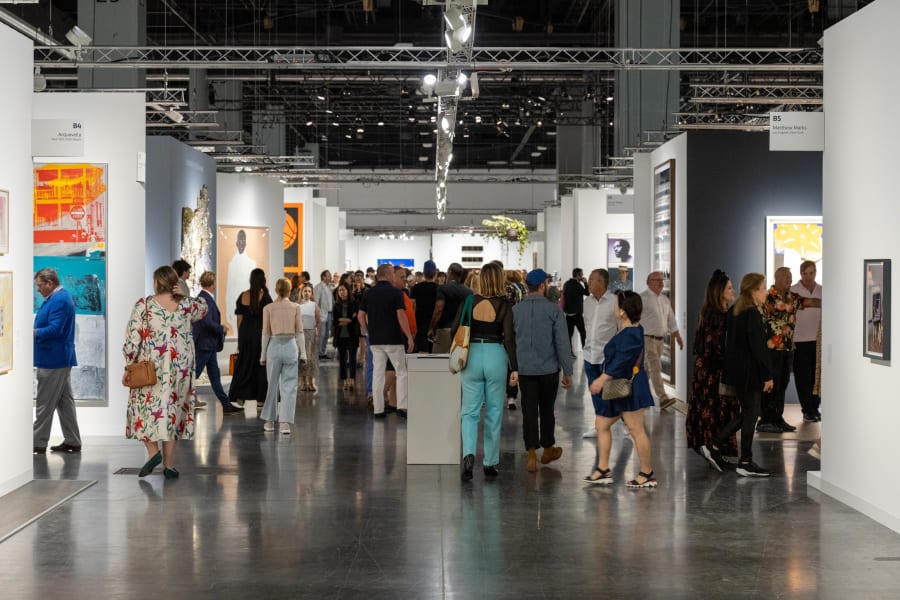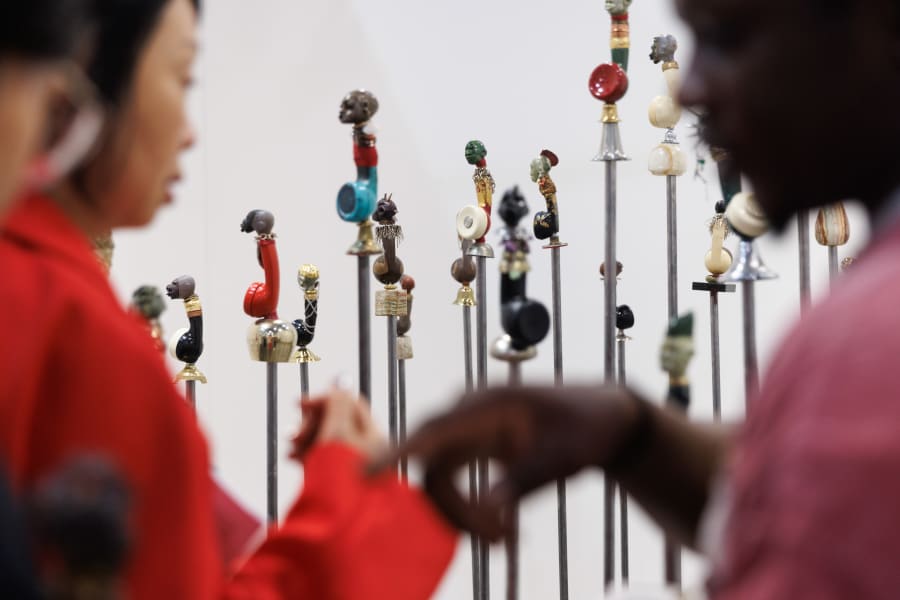Forty-eight hours before Art Basel Hong Kong opens, time suddenly becomes everyone’s most sought-after resource. The show floor is abuzz with a run-up of building walls, unpacking crates, installing booths, setting up temporary restaurants, and much more. But for these intense 2 days (and of course, the fair altogether) to go smoothly, a team of people – from Hong Kong to New York – are at work for months. The Art Basel team organizes and strategizes, designs floor plans, connects with galleries and collectors, aligns with partners, creates content, and optimizes logistics. Who are the people who make Art Basel fairs, and Art Basel Hong Kong in particular, happen – and how do they do it?
One answer to the ‘how’ could be: very carefully, and well in advance. Consisting of about 25 core colleagues, the Art Basel Hong Kong team starts working on the following year’s edition right after the show ends. There is, of course, a short moment to breathe. ‘After the show you have a kind of postpartum syndrome,’ jokes Angelle Siyang-Le, Art Basel Hong Kong’s director since November 2022 (she headed Art Basel’s development in greater China and the fair’s gallery relations in Asia, prior to taking on the Hong Kong directorship). ‘It’s a quiet time to prepare the next cycle and there’s a lot of strategizing,’ she says. ‘There’s also time to send thank-you emails and catch up for lunch with my team members.’ Still, applications for the next year’s show come in almost immediately, explains Senior Gallery and Project Manager Claudia Chan, who joined Art Basel 9 years ago, originally as a student assisting the regional VIP team. ‘Supporting galleries on their involvement in Art Basel Hong Kong starts much earlier than most people imagine,’ she says.
A few months after the show closes, applications for the next one are in, and over the summer, the Art Basel Hong Kong selection committee members – gallerists from Indonesia, the United States, Japan, South Korea, Switzerland, and other countries – read and debate the hundreds of gallery applications one by one, poring over proposals for booths and sector entries. In the fall, it is ‘back to school,’ as Siyang-Le puts it, and preparations get serious. By November, the next edition’s participating galleries have been announced; it is time to lay out floor plans and decide gallery placements, as the heat for the logistics and operations teams rises.
‘The show is kind of a beast,’ says Suez Lui, Regional Head of Operations, Asia. Lui starts working on the next edition, alongside everyone else, directly after the previous fair closes. ‘I’m talking to every department, from galleries to the VIP team, the marketing team, the partnership team, and the directors, to understand what they want for the new edition,’ she explains. ‘The time after the show is about reviewing, analyzing, planning. But from December through March, it’s like a countdown for a rocket launch,’ she laughs.
Lui sees her job as a ‘jigsaw puzzler,’ putting together the disparate pieces of a fair into a cohesive big picture. She is the person who assesses whether food and beverage stations are in just the right locations across the Hong Kong Convention and Exhibition Centre; she is involved in making sure that architects design appropriate booths and contractors build walls correctly; she must always keep in mind how a visitor might experience the space once the show is underway. ‘My goal is to make sure that visitors can get from A to B to Z as smoothly as they can: I like to think things through in a lot of detail,’ she says. ‘What is the best way, and the best service? I literally have the whole show in my head before we start.’ In the 2-day set-up period before the opening (compared to Art Basel’s other fairs, the building time at the Hong Kong Convention and Exhibition Centre is exceedingly tight), the number of people working on and for the fair, ranging from architects and builders to art handlers, caterers, VIP tour guides, and ticket takers (the latter of whom come back year after year), balloons to the thousands.
The Hong Kong colleagues share a palpable passion for what they do (‘this is a passion business,’ explains Siyang-Le), but come from different professional backgrounds. Chan studied art history and comparative literature; Siyang-Le worked in galleries and for art collections in Dubai’s then-exploding art world before joining Art Basel in 2012. Lui grew up in the UK, where she spent her youth taking orders and delivering food for her family’s Chinese takeaway restaurant in Manchester. Later, she worked as an account manager for an exhibitions company before taking on the management of operations and logistics at Art Basel Hong Kong in 2013, its inaugural year. She attributes her knack for logistics to her earliest work experience.
‘An Art Basel job is very intense,’ explains Siyang-Le, meaning that colleagues know how to respond flexibly to the tremendous time pressure and unpredictability that can emerge prior to and during a show’s run. ‘All of us want to do more than what we are asked for,’ says Chan. ‘Most of our team members are super eager to realize the projects with a level of passion and thoughtfulness that is, I think, quite unparalleled in other corporate industries – we are keen to support galleries and artists to realize their projects.’
Zooming out, several team members work across all four fairs to connect Hong Kong to the rest of the Art Basel universe, including Irene Kim, the New York-based Global Head of VIP Relations. Kim’s typical day starts very early ‘to take advantage of the time zone overlap,’ and check in with her global team of about 40, spread across four continents and active in 21 key art markets. A primary mission is to develop Art Basel’s global visibility (‘VIP means audience, and audience is required everywhere,’ she says) and build bridges between regional and international art markets. Here, Art Basel’s worldwide network of VIP representatives, which supports the company’s efforts to activate local art communities year-round, plays a key role.
Another objective is drumming up excitement, and assuring that visitors receive a 360-degree art experience at the fair – which is done in collaboration with Art Basel’s other departments, from content & communications to marketing and partnerships. At Art Basel, the presence of VIP clients – a wide variety of art world professionals who actively contribute to a dynamic art world, from collectors to curators and museum representatives – is paramount for exhibitors. Similarly, VIP clients expect galleries to be vetted rigorously and bring their best works. ‘The global buzz is more important than one thinks,’ explains Kim, whose CV includes positions at Sotheby’s, The Armory Show, and the Guggenheim Museum.
Dunja Gottweis’s position as Global Head of Gallery Relations also includes relaying information between Art Basel’s departments, but her primary objective is to ensure that a gallery’s participation in the fair runs smoothly. To do so, Gottweis and her team identify and implement best practices that guarantee a consistently high level of service for exhibitors, independently of a fair’s location or a gallery’s business model. ‘Many of our clients participate in several of our shows. We want to embark them on the Art Basel journey and help them feel in sync with us across all regions,’ she says.
Gottweis and her team also pursue long-term strategies, like cultivating relationships with existing clients and fostering new connections with art dealers across the world. ‘Because we have so many fairs, the beauty of Art Basel is that we do not learn from the fair once a year, but four times a year. We learn from each other, and we learn from the feedback that we receive from our galleries,’ says Gottweis, who before joining Art Basel in 2011 worked at the Museum of Applied Arts in Vienna and has an academic background in international business administration. ‘One of the most important things in my role is to share that knowledge and to find solutions quickly and easily.’
Chan appreciates the opportunity to see Art Basel Hong Kong’s processes as they unfold: participating in selection committee meetings; discovering the art that galleries bring; and taking part in orchestrating a large-scale event that has ‘changed Hong Kong’s art ecosystem,’ as she puts it. Lui values ‘driving the excellence of the show’ with new ideas and learning from all of Art Basel’s departments and clients. ‘For galleries, it’s always about how they can improve the way to show their artists. Then it’s learning from the VIP team how to tap into collector bases, and how the partnership team finds new brands to collaborate with. There’s always something to learn.’
Siyang-Le loves seeing so much art, meeting inspiring people, and always moving forward (this year, for example, Art Basel Hong Kong’s public programs, including Conversations, films, and performances, will take place in a single designated area, free of charge to the public). ‘This job allows me to see the constant evolution in the definition of and tastes toward contemporary art,’ she says. Apropos evolution, Kim sees it as a driving force in a job that for her has never had a dull moment. ‘Now we have four shows. How do you stay ahead of the game? We’re always trying to take it to the next step.’
Kimberly Bradley is a writer, editor, and educator based in Berlin. She is a commissioning editor at Art Basel Stories.
Published on February 23, 2024.
Caption for top image: A view of Tina Keng Gallery's booth at Art Basel Hong Kong 2023.


